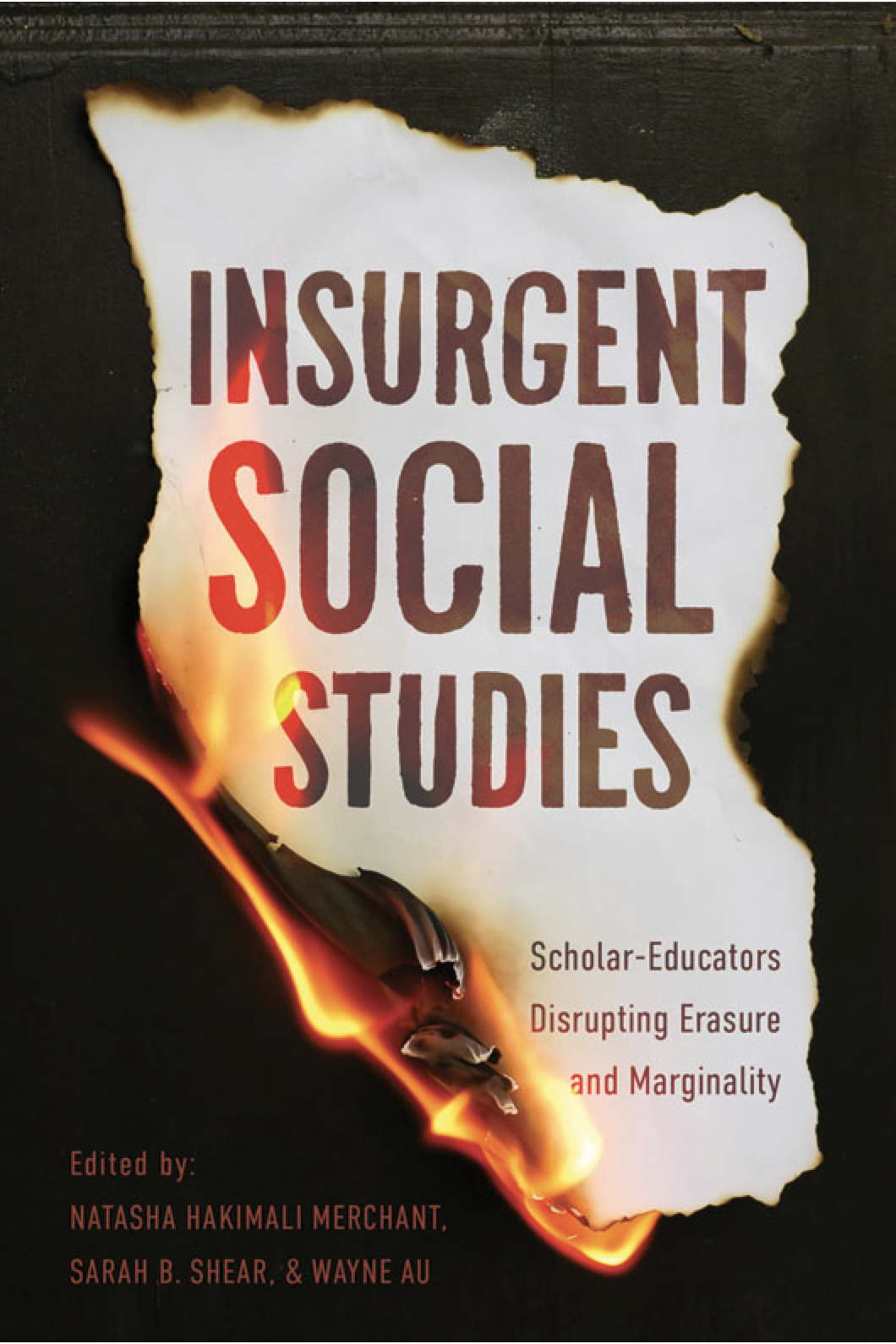Insurgent Social Studies: Scholar-Educators Disrupting Erasure and Marginality has just been published by Myers Education Press.
The collection brings together contributions from a “new(er)” generation of social studies scholar-educators who take as one of their starting points a social studies curriculum that is “designed to erase or otherwise marginalize voices, bodies, and experiences not accepted by or created for the benefit of white supremacist society.”
The project was inspired by Wayne Au’s conception of pedagogy of insurgency. Au describes this kind of pedagogy as requiring:
- Bravery and risk, as rebellious educators take the step of fighting back against social and educational injustice in public and visible ways.
- Allies, accomplices, and solidarity, as educators and community members come together across different identities in order to build a more broad-based and effective movement for educational justice. This, in turn, also helps to mitigate risk.
- Understanding organizing, protest, and demonstrations as a valuable and worthwhile form of pedagogy and curriculum in itself.
- Using critical analyses of power as a central approach for teaching and learning about social and educational injustice.
- Developing a curriculum of insurgency for educators, students, and the community to engage in critical analyses of power in schools and society.
- Embracing schools as sites of both oppression and liberation, and in the process also reimagining the role that schools can play in broader social change.
- Connecting to broader social movements, as educators, students, and community see and understand that their own struggles for justice and liberation are part of broader, historic traditions in the fight for change.
The editors, Natasha Hakimali Merchant, Sarah B. Shear and Wayne Au, argue that “taken as a whole, a pedagogy of insurgency seeks to understand and at least partially explain the ways that teachers have the power – through pedagogy, curriculum, and community activism – to actively resist injustice while also working towards a more radically just world.
This is a path-breaking work in social studies education and anyone who is engaged and the political/pedagogical struggles for social justice in schools and the larger society will benefit from reading this collection.
I want to thank the editor for inviting me to write a brief Afterword.
Table of Contents
Introduction – We Won’t Wait Any Longer: An Introduction and Invitation to Insurgency for Social Studies
Natasha Hakimali Merchant, Sarah B. Shear, and Wayne Au
1. Insurgence Must Be Red: Connecting Indigenous Studies and Social Studies Education for Anticolonial Praxis
The Turtle Island Social Studies Collective
2. Solidarity Is a Verb: What the Black Lives Matter Movement Can Teach Social Studies About the Intersectional Fight Against Anti-Black Racism
Tiffany Mitchell Patterson
3. The Audacity of Equality: Disrupting the Distortion of Asian America in Social Studies
Noreen Naseem Rodríguez and Esther June Kim
4. “Existence Is Resistance”: Palestine and Palestinians in Social Studies Education
Hanadi Shatara
5. Insurgente: A Familia in Conversation About Latinxs Voices in the Field of Social Studies
La Familia Aponte-Safe Tirado Díaz Beltrán Ender Busey Christ
6. Unsatisfied: The Conceptual Terrain of De-Essentializing Islam in Social Studies
Natasha Hakimali Merchant
7. Queer Worlding as Historical Inquiry for Insurgent Freedom-Dreaming
Tadashi Dozono
8. Democracy Is Interdisciplinary: The Case for Radical Civic Innovation Across Content Areas
Antero Garcia, Nicole Mirra, and Mark Gomez
9. Cultural Bombs and Dangerous Classes: Social Studies Education as State Apparatus in the War on Terror
Jennice McCafferty-Wright
10. Whiteness and White Responsibility in Social Studies
Andrea M. Hawkman
Afterword – Insurgent Social Studies and Dangerous Citizenship
E. Wayne Ross

 Follow
Follow
